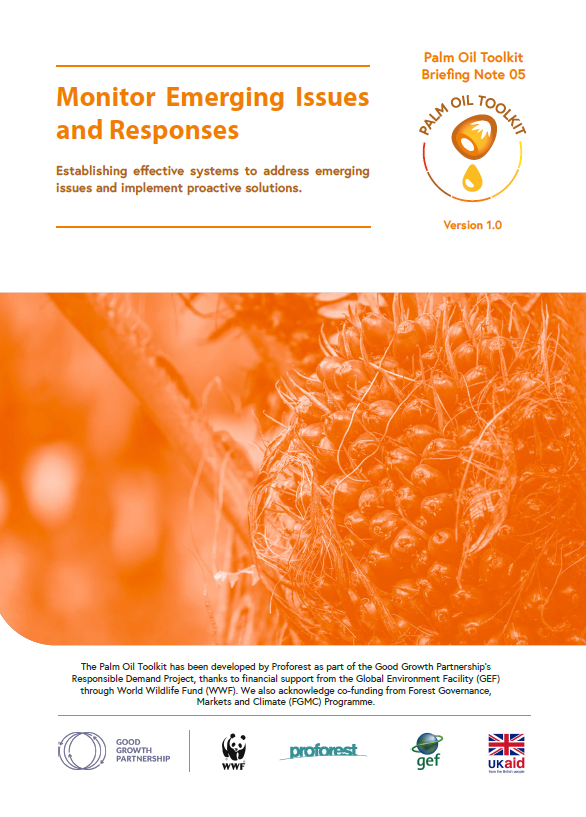Element 5: Monitor Emerging Issues and Responses
While progress has been made in addressing the key social and environmental risks in the palm oil sector, some issues remain and have been exacerbated by external factors and a lack of risk mitigation. This briefing note provides companies with information on these emerging issues and mitigating actions implemented by industry players and supporters to address them. Trends in international regulations are also introduced in this briefing note.
This briefing note is grouped into 2 main sections, namely:
1. EMERGING ISSUES IN THE PALM OIL SECTOR
This section includes emerging issues such as the climate crisis, water stress and impacts on human rights and livelihoods. When talking about the climate crisis, this briefing note highlights the contribution of oil palm cultivation to environmental degradation and climate change, and vice versa. The topic of water stress introduces issues such as water availability, pollution and water quality. Impacts on human rights and livelihoods includes negative impacts on the livelihoods of communities, climate-induced migration and modern slavery, political instability, and pandemic-related issues.
2. PROACTIVE ACTIONS NEEDED FOR POSITIVE IMPACTS
This section highlights examples of mitigation and adaption measures that can be taken individually and collectively to reduce negative impacts from climate change and to ensure oil palm is not grown or produced at the expense of people and planet. Some examples of actions include: public sector actions and initiatives, nature-based solutions, GHG scope 3 emission reduction, regenerative agriculture, use of technology and digital services (i.e. worker voice technologies), and sustainability due diligence. Some examples of topics covered under public sector actions and initiatives are the United States CBP sanctions on Malaysian palm oil companies, European Union Deforestation Due Diligence, Global Methane Pledge, commitments and progress made during CoPs, and China’s stronger climate commitments and policies. Under the topic of Nature-based solutions, information is given on rehabilitation within concessions, linkages and connectivity, and recovery plans. This section also provides companies with information on: ways to mitigate their scope 3 emissions, regenerative agriculture, worker voice technologies and some industry examples (i.e. MY Voice, Ulula and Suara Kami (Our Voice)), and sustainability due diligence.
More information is available in the briefing note below – BN05 Emerging Issues



